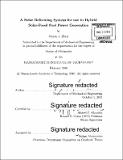| dc.contributor.advisor | Ahmed F. Ghoniem. | en_US |
| dc.contributor.author | Sheu, Elysia J. (Elysia Ja-Zeng) | en_US |
| dc.contributor.other | Massachusetts Institute of Technology. Department of Mechanical Engineering. | en_US |
| dc.date.accessioned | 2016-07-18T20:05:06Z | |
| dc.date.available | 2016-07-18T20:05:06Z | |
| dc.date.copyright | 2016 | en_US |
| dc.date.issued | 2016 | en_US |
| dc.identifier.uri | http://hdl.handle.net/1721.1/103734 | |
| dc.description | Thesis: Ph. D., Massachusetts Institute of Technology, Department of Mechanical Engineering, 2016. | en_US |
| dc.description | Cataloged from PDF version of thesis. | en_US |
| dc.description | Includes bibliographical references (pages 229-241). | en_US |
| dc.description.abstract | As demand for energy continues to rise, the concern over the increase in emissions grows, prompting much interest in using renewable energy resources such as solar energy. However, there are numerous issues with using solar energy including intermittency and the need for storage. A potential solution is the concept of hybrid solar-fossil fuel power generation. Previous work has shown that utilizing solar reforming in conventional power cycles has higher performance compared to other integration methods. In this thesis, a two level analysis of a hybrid redox redox cycle is performed. First, a system analysis of a hybrid cycle utilizing steam redox reforming is presented. Important cycle design and operation parameters such as the oxidation temperature and reformer operating pressure are identified and their effect on both the reformer and cycle performance is discussed. Simulation results show that increasing oxidation temperature can improve reformer and cycle efficiency. Also shown is that increasing the amount of reforming water leads to a higher reformer efficiency, but can be detrimental to cycle efficiency depending on how the reforming water is utilized. Next, a system analysis for a CO2 redox reforming hybrid cycle and comparison of cycle and reformer performance between a CO 2 redox reformer and steam redox reformer hybrid cycle are presented. Similar to the steam redox system, results show that increasing the oxidation temperature or the amount of reforming CO2 leads to higher reformer and cycle efficiencies. In addition, the comparison between the CO2 and steam redox reformer hybrid cycles shows that the CO2 cycle has the potential to have better overall performance.Based on the system analysis, a reformer level analysis is also performed. A novel receiver reactor concept for a solar steam redox reformer is presented, and a computational model is developed to assess its performance. The receiver-reactor consists of a dumbbell shape absorber system that has two distinct absorbers. This absorber system setup allows for the switching between reduction and oxidation steps without having to constantly change inlet streams to the reactor and is designed such that the inlet connections do not interfere with the solar window. In addition, at any point in time only one solar absorber is irradiated by the solar energy (during the reduction step). Simulation results show that the receiver-reactor strongly absorbs the solar radiation and most of the radiative heat transfer occurs in the front half of the reactor. Moreover, results show that higher conductivity absorber materials are more suitable for long term reactor operation. A sensitivity analysis is also performed for the solar steam redox reformer with respect to different performance metrics. Important parameters include channel size, inlet temperature, and reformer pressure. Moreover, a strategy for reactor design based on performance as well as integration with the power cycle is discussed. | en_US |
| dc.description.statementofresponsibility | by Elysia J. Sheu. | en_US |
| dc.format.extent | 241 pages | en_US |
| dc.language.iso | eng | en_US |
| dc.publisher | Massachusetts Institute of Technology | en_US |
| dc.rights | M.I.T. theses are protected by copyright. They may be viewed from this source for any purpose, but reproduction or distribution in any format is prohibited without written permission. See provided URL for inquiries about permission. | en_US |
| dc.rights.uri | http://dspace.mit.edu/handle/1721.1/7582 | en_US |
| dc.subject | Mechanical Engineering. | en_US |
| dc.title | A solar reforming system for use in hybrid solar-fossil fuel power generation | en_US |
| dc.type | Thesis | en_US |
| dc.description.degree | Ph. D. | en_US |
| dc.contributor.department | Massachusetts Institute of Technology. Department of Mechanical Engineering | |
| dc.identifier.oclc | 953451541 | en_US |
